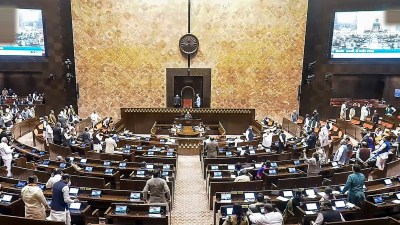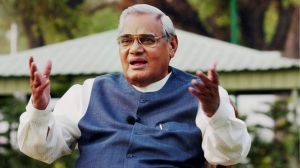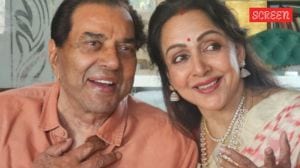Recalling the Emergency years
In 1975, the government of Prime Minister Indira Gandhi imposed the Emergency, widely seen as the darkest hour of India’s democracy.
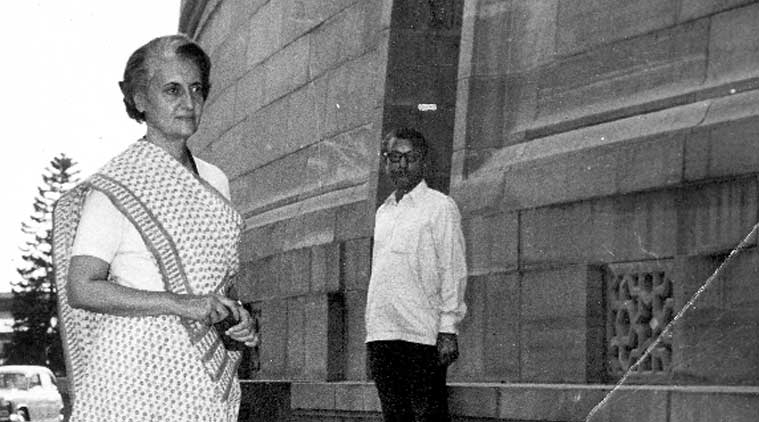 Indira arrives in Parliament on October 10, 1976. (Source: Express Archive) Dec 18: 42nd Constitution Amendment Act commences with President’s assent, almost revising the Constitution. The Preamble is amended, along with 53 articles and the Seventh Schedule, Fundamental Duties are introduced, Fundamental Rights degraded, Parliament is given primacy over courts, and judicial challenges to the changes are disallowed. The post-Emergency government repealed most of these amendments
Indira arrives in Parliament on October 10, 1976. (Source: Express Archive) Dec 18: 42nd Constitution Amendment Act commences with President’s assent, almost revising the Constitution. The Preamble is amended, along with 53 articles and the Seventh Schedule, Fundamental Duties are introduced, Fundamental Rights degraded, Parliament is given primacy over courts, and judicial challenges to the changes are disallowed. The post-Emergency government repealed most of these amendments
1975-76:
Arrests, Torture, Assaults on Constitution; Worldwide Protests and Condemnation
1975
JUL 7: CRPF surrounds dormitories at Jawaharlal Nehru University, arrests 60 students, 10 of whom are kept in jail for weeks
JUL 10: Bombay University teachers write to Indira to protest Emergency, 4 months later, their leaders are jailed under MISA
JUL 21: Parliament meets, Jagjivan Ram moves motion for approval of Emergency, which Lok Sabha approves. Newspapers barred from reporting speeches by Opposition leaders like A K Gopalan, Somnath Chatterjee, H M Patel, Era Sezhiyan
JUL 22: Rajya Sabha too approves Emergency; both Houses pass the 38th Amendment Bill, prohibiting judicial review of the proclamation of Emergency and associated curbs on freedoms
[related-post]
AUG 1: With 30 MPs in jail, President approves the 38th Amendment
AUG 6: Election Laws (Amendment) Act, 1975 specifically changes the law to nullify Allahabad High Court Justice Jagmohan Lal Sinha’s order convicting Indira Gandhi of electoral malpractice
AUG 7-8: With many members detained or underground, Parliament passes the 39th Amendment Bill, placing the elections of the President, Vice-President, Prime Minister and Speaker outside the purview of the judiciary. Also puts MISA in Ninth Schedule, giving it judicial immunity. State legislatures are summoned to ratify amendment on August 9; India’s “fastest ever” constitutional amendment gets Presidential assent on August 10
AUG 9: Days ahead of the Supreme Court hearing on Indira’s appeal, Rajya Sabha adopts the 41st Amendment, giving the Prime Minister permanent immunity from civil and criminal proceedings
AUG 15: Advertisements signed by several hundred prominent persons appear in The Times, London and The New York Times, saying “Today is India’s Independence Day. Don’t let the light go out of Indian democracy. Free Jaiprakash Narayan”
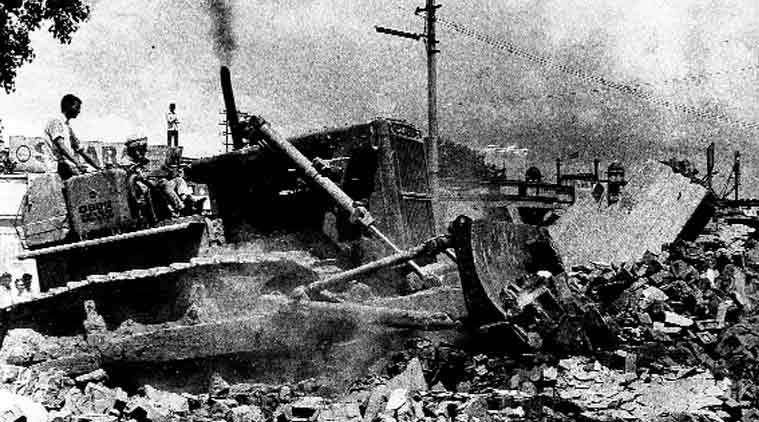 Apr 19: Bulldozers destroy tenements around Jama Masjid at Turkman Gate in Old Delhi. Police fire on resisting residents, killing and injuring an undisclosed number.
Apr 19: Bulldozers destroy tenements around Jama Masjid at Turkman Gate in Old Delhi. Police fire on resisting residents, killing and injuring an undisclosed number.
1976
JAN 8: President suspends the “Seven Freedoms” guaranteed by Article 19 of the Constitution
JAN 24: Parliament approves Ordinance that took away the power of courts to ask for reasons for detention under MISA
JAN 26: 2,000 march in London in “Alliance Against Fascist Dictatorship in India”; world leaders appeal to Indira to “Let Mahatma Gandhi come to India”
JAN 31: DMK government sacked, Tamil Nadu Assembly dissolved, 700 arrested
MAR 5: 80 American Nobel laureates, academics and peace activists ask Indira to restore Fundamental Rights
MAR 12: Gujarat government dismissed, President’s Rule imposed
APR 28: Reversing orders passed by seven High Courts, a Supreme Court Bench led by Chief Justice A N Ray rules by a 4-1 majority that no one could move a writ petition for habeas corpus or for a judicial questioning of the Emergency. The dissident judge in the infamous “Habeas Corpus case”, the legendary Justice Hans Raj Khanna, who wrote that the constitutional right to life and liberty was not subject to executive decree, was punished by being superseded for the post of CJI.
MAY 1: Lawrence Fernandes of Bangalore is arrested and tortured to force him to reveal the whereabouts of his trade unionist brother George, the only major Opposition leader to have escaped the police dragnet
MAY 2: All India Radio bans Kishore Kumar’s songs as punishment for refusing to support the Youth Congress
MAY 24: Government gives figures of arrests, since June 26, 1975, of those “involved in circulation of clandestine literature opposing Emergency”: more than 7,000
JUN 3: International League of Human Rights complains to the UN about India’s official policy of torture, brutality, starvation and ill-treatment of political prisoners
JUN 11: Vinoba Bhave’s ashram is raided for copies of its journal Maitree. Other journals such as Opinion, Himmat, Freedom First, Srujana, Bhumiputra, Thuglak, Swarajya are harassed or banned
JUN 31: More journals are silenced: Seminar, Janata, Sadhana, Quest
AUG 10: With a warrant out for him, Subramanian Swamy, who had escaped to the US, makes a dramatic appearance in Parliament and, after a quick intervention, slips out and flees the country once again
AUG 16: Eight editions of The Indian Express are pre-censored and delayed; the same day, Indira Gandhi declares to Non-Aligned countries in Colombo that there is “no censorship in India”
SEP 20: ‘Indians for Democracy’ begin Long March from Liberty Bell, Philadelphia, to reach the UN on October 1. The same day, the Home Ministry announces that 22 members of Lok Sabha and 11 of Rajya Sabha are under detention. Advertisements to The Indian Express, The Statesman and The Tribune are quietly withdrawn
OCT 2: Veteran freedom fighters Acharya J B Kripalani, H V Kamath and Dr Sushila Nayyar are arrested at Rajghat
OCT 18: Police kill 43 for protesting compulsory sterilisation in Muzaffarnagar
OCT 30: 28 MISA detenues in Varanasi jail are thrown into solitary confinement in chains for going on a protest fast and raising slogans against Indira Gandhi
NOV 5: Lok Sabha, whose term was to have ended in March 1976, gives itself a second extension, until November 1977
NOV 6: Massive police force rounds up 180 UP villagers for forced sterilisation
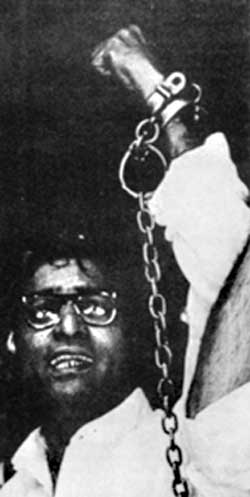 Jun 10: George Fernandes is finally arrested in Calcutta on charges of allegedly smuggling dynamite to blow up government buildings (the so-called Baroda Dynamite Case). On June 16, a joint statement is issued by Willy Brandt, chairman of the German Social Democratic Party, Austrian Chancellor Bruno Kreisky and Swedish Prime Minister Olof Palme expressing “great concern and dismay” over Fernandes’s ill-treatment
Jun 10: George Fernandes is finally arrested in Calcutta on charges of allegedly smuggling dynamite to blow up government buildings (the so-called Baroda Dynamite Case). On June 16, a joint statement is issued by Willy Brandt, chairman of the German Social Democratic Party, Austrian Chancellor Bruno Kreisky and Swedish Prime Minister Olof Palme expressing “great concern and dismay” over Fernandes’s ill-treatmentin prison
1977:
Indira’s Sudden Change of Heart, Return of Democracy
JAN 18: Indira Gandhi dissolves Lok Sabha, announces “fresh elections”
JAN 20: Certain rules of the Emergency are declared “relaxed”, including press censorship. The Congress (O), Jana Sangh, Bharatiya Lok Dal and Socialist Party form the Janata Party
JAN 23: Morarji Desai chairs the National Committee of the Janata Party
FEB 2: Jagjivan Ram resigns as minister; on February 5, forms Congress For Democracy
MAR 16: Polling begins
MAR 19-20: Indira, Sanjay, Bansi Lal and many Cabinet ministers lose elections
MAR 21: Internal Emergency and press censorship orders are revoked
MAR 22: Indira Gandhi resigns; Janata Party gets majority in Parliament; ban on 26 organisations is lifted
MAR 24-25: Prime Minister Morarji Desai forms the Janata Party Cabinet
MAY 28: Janata government appoints a Commission of Inquiry under former Chief Justice of India J C Shah to probe excesses, malpractices and abuse of authority during the Emergency
(Adapted from, among other sources, chronology of the Emergency prepared by Prabhudas T Sanghvi for Voices of Emergency, (ed) John Oliver Perry)
- 01
- 02
- 03
- 04
- 05


